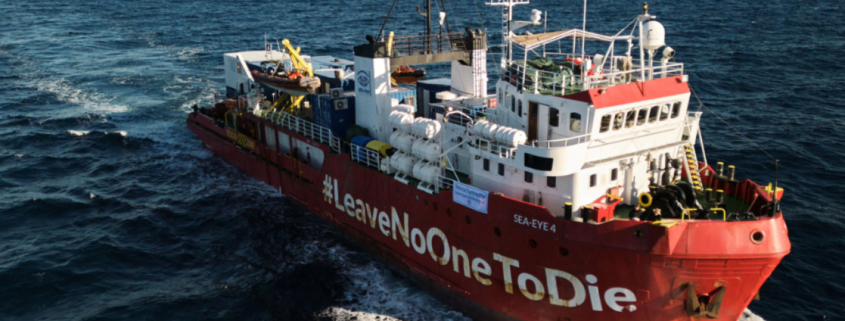After 60 days of detention: SEA-EYE 4 returns to operation
In the ongoing court proceedings, the allegations were deemed not proven
On May 14 2024, the SEA-EYE 4 set off on its mission from the port of Taranto, Italy. The Italian authorities had detained the rescue ship for 60 days and Sea-Eye e.V. filed an appeal against this. This is the longest administrative detention so far imposed on a sea rescue vessel under the so-called Piantedosi Decree. Following an initial hearing, the allegations that the crew of the SEA-EYE 4 did not follow the instructions of the so-called Libyan coastguard were deemed not proven by the presiding judge. The final decision is still pending.
“The fact that the presiding judge considers the allegations that led to our detention to be not proven shows that this is a politically motivated measure with no legal basis. Despite all the difficulties caused by the Italian government’s policy, we continue to fulfil our humanitarian responsibility, thanks, above all, to the active support we receive every day from private and institutional donors, as well as volunteers and full-time staff on shore and on board!”, emphasises Gorden Isler, Chairman of Sea-Eye e.V.
Daniela Klein, a doctor from German Doctors and part of the crew on the SEA-EYE 4 for the fifth time, adds: “Since my first mission in 2021, the situation for people fleeing war, torture, poverty, and rape has not improved, but, on the contrary, has worsened considerably. There are more and more dramatic rescue missions, civilian sea rescuers are massively constricted in their work by regulatory measures, and people continue to drown in the Mediterranean. My drive and motivation therefore remain unchanged: to oppose this shameful and outrageous policy, and, as a member of the crew, to help save refugees in distress from drowning at sea, and to provide them with medical assistance.”
The Piantedosi Decree, which was introduced at the beginning of 2023, makes the work of civilian sea rescuers considerably more difficult. As an example, it stipulates that rescue ships must head directly to a specified harbour after a mission and may not respond to any further distress calls. Alleged violations are penalised with fines and detentions. The reason the Italian authorities gave for the detention of the SEA-EYE 4 in March 2024 was that on March 7, the ship did not follow the instructions of the so-called Libyan Coast Guard, which was pointing weapons at the rescue boat, and did not hand people seeking protection over to them. The SEA-EYE 4 rescued a total of 84 people indistress at sea during the operation. It was only in February of this year that Italy’s highest court of appeal classified the handover of people to the so-called Libyan coastguard as a criminal offence, as Libya is in the midst of a civil war and due to serious human rights violations such as torture, slavery, rape, and arbitrary executions is not a safe place.
The Piantedosi Decree has already resulted in the arrest of numerous sea rescue ships. Meanwhile, according to the International Organisation for Migration (IOM), more than 730 people have drowned or disappeared in the Mediterranean in 2024 so far.



 Guillaume Duez
Guillaume Duez